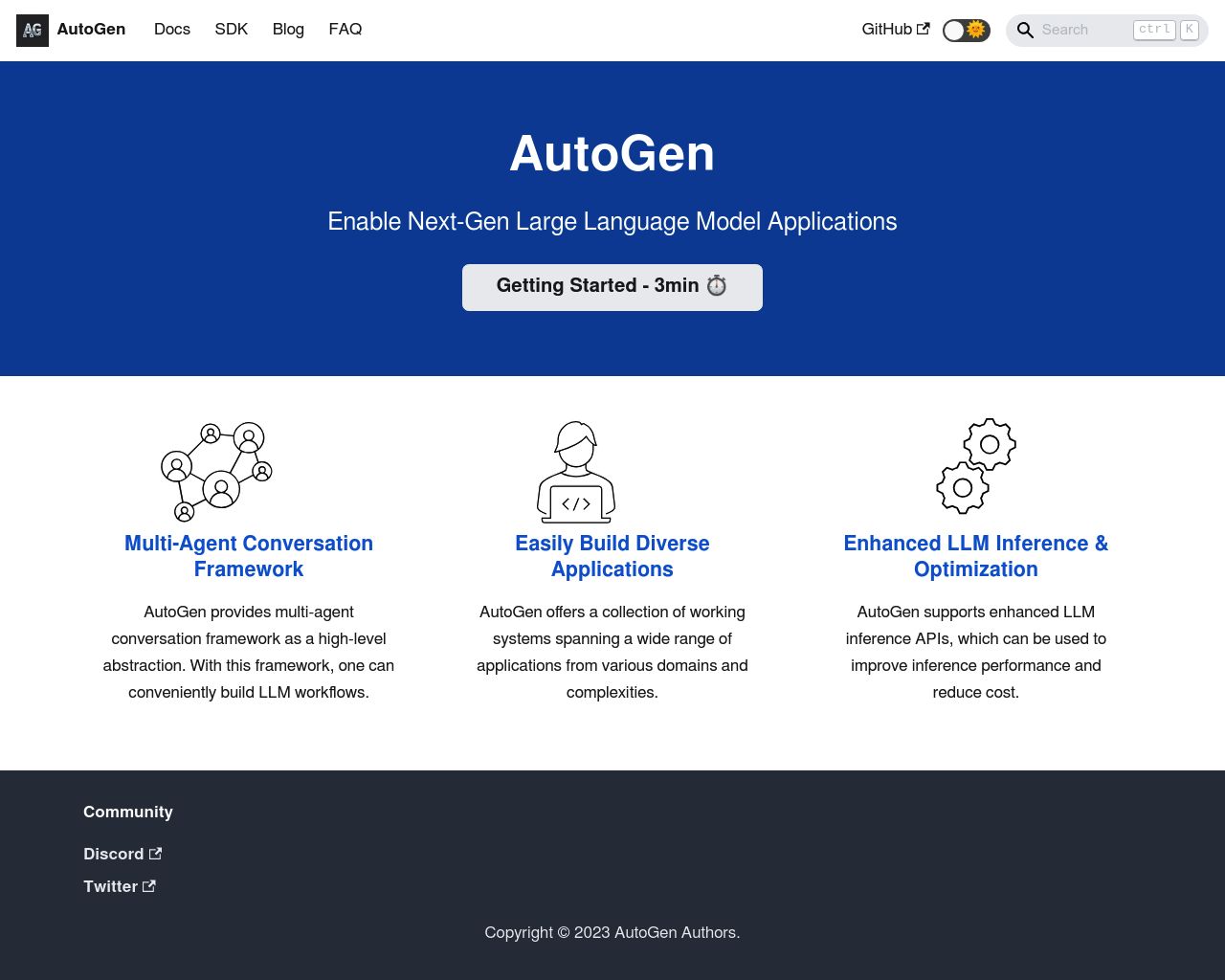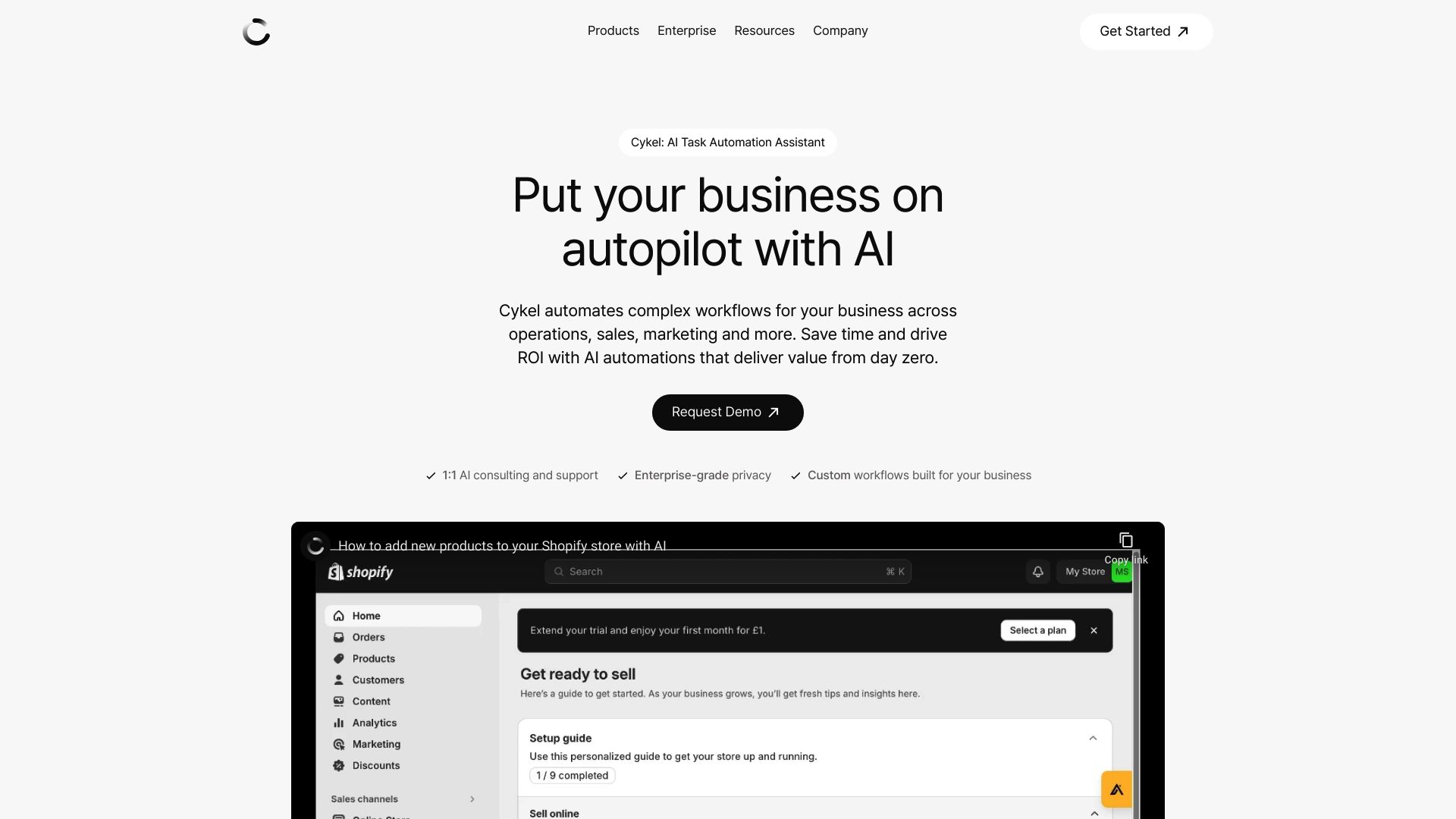AutoGen vs. Cykel AI: Which Is Right for Your Business?
AI agent builders AutoGen and Cykel AI offer distinct approaches to automating complex tasks and workflows. AutoGen empowers developers with a framework for creating sophisticated multi-agent systems, while Cykel AI focuses on streamlining repetitive digital tasks through a user-friendly interface. This comparison delves into the strengths and limitations of both platforms, exploring their core features, deployment options, and suitability for different user groups. We’ll examine how these tools stack up against SmythOS, a versatile AI agent builder that combines powerful functionality with exceptional ease of use. Whether you’re a developer seeking advanced customization or a business professional looking to automate workflows, this analysis will help you choose the AI solution that best fits your needs.
AutoGen Overview
AutoGen empowers developers to create sophisticated AI applications through multi-agent conversations. This open-source framework facilitates interactions between customizable agents, Large Language Models (LLMs), tools, and humans to tackle complex tasks.


AutoGen’s core strength lies in its multi-agent conversation capabilities. The platform enables autonomous task performance and human-in-the-loop problem-solving, adapting to various use cases. It maximizes LLM performance through enhanced inference features like tuning, caching, and error handling.
AutoGen empowers developers to create sophisticated AI applications through multi-agent conversations.
Developers can tailor agents to specific needs, integrating LLMs, human inputs, and diverse tools. AutoGen demonstrates effectiveness across applications from automated task solving to code generation and complex problem-solving in group chats. The framework includes debugging tools and logging functionalities for API calls, essential for optimizing LLM-based systems.
AutoGen’s EcoOptiGen feature provides cost-effective LLM tuning, highlighting its focus on efficiency. While the platform offers powerful capabilities for AI development, it requires coding knowledge, potentially limiting accessibility for non-technical users. The lack of a visual builder or no-code editor may pose challenges for those seeking a more intuitive development experience.
In the competitive landscape, AutoGen positions itself as a versatile tool for conversational AI and LLM applications. Its emphasis on multi-agent collaboration and enhanced LLM utilization sets it apart. However, platforms offering visual builders or no-code options may have an edge in user-friendliness for beginners or non-technical professionals.
Cykel AI Overview
Cykel AI transforms repetitive digital tasks into streamlined, automated workflows across industries. This AI assistant integrates seamlessly with existing systems, allowing users to automate tasks like data entry, lead generation, and CRM updates using simple language instructions.
Cykel AI transforms repetitive digital tasks into streamlined, automated workflows across industries… allowing users to automate tasks like data entry, lead generation, and CRM updates using simple language instructions.


Cykel AI distinguishes itself through proactive task automation, cross-platform functionality, and a no-coding interface. Unlike traditional AI tools that primarily provide information, Cykel AI functions as the ’hands’ to complement the ’brain’ of AI systems, performing actual digital tasks.
Cykel AI distinguishes itself through proactive task automation, cross-platform functionality, and a no-coding interface.
Launched in December 2023, Cykel AI’s Task operating system offers intelligent task prioritization and seamless cross-platform integration. The platform caters to professionals in sales, HR, recruitment, e-commerce, marketing, operations, project management, customer service, and finance.
Cykel AI’s browser control feature stores personal details and website-specific instructions, enabling quick task completion across multiple web applications. This universal integration positions Cykel AI as a versatile personal AI assistant for various professional settings.
While Cykel AI excels in task automation and cross-platform functionality, it lacks some advanced features found in other AI agent builders. The platform doesn’t offer a visual builder or no-code editor, which may limit accessibility for non-technical users. Additionally, Cykel AI doesn’t provide features like constrained alignment, data encryption, or IP control, which could be concerns for enterprises with stringent security requirements.
Cykel AI’s vision focuses on improving business processes by automating mundane digital tasks, allowing users to concentrate on more meaningful work. The company aims to expand into the UK, Europe, and North America, building strategic partnerships to drive broader AI adoption.
Feature Comparison
AutoGen and Cykel AI offer different approaches to AI agent development and automation. AutoGen provides a framework for creating sophisticated multi-agent systems capable of complex interactions and problem-solving. It excels in customizable agent creation, enhanced LLM inference, and support for autonomous operations with optional human involvement. AutoGen’s strength lies in its flexibility for developers to tailor agents for specific needs across various applications.
Cykel AI, on the other hand, focuses on automating repetitive digital tasks through a more user-friendly interface. It emphasizes proactive task automation and cross-platform functionality without requiring coding skills. Cykel AI’s browser control feature and universal integration capabilities make it particularly suited for professionals looking to streamline workflows across multiple web applications.
While both platforms aim to enhance productivity through AI, they differ significantly in their core components and security features. AutoGen offers more robust debugging tools, supports multimodal interactions, and provides features for explainability and transparency in AI decision-making. It also includes enhanced security measures like OAuth support for API authentication. Cykel AI, while strong in task automation, lacks some of the advanced features and security options that AutoGen provides, such as constrained alignment, data encryption, and extensive API integrations.
Feature Comparison Table
| AutoGen | Cykel AI | SmythOS | |
|---|---|---|---|
| CORE FEATURES | |||
| Hosted Agents (Dev, Production) | ✅ | ❌ | ✅ |
| Visual Builder | ❌ | ❌ | ✅ |
| No-Code Options | ❌ | ✅ | ✅ |
| Explainability & Transparency | ✅ | ❌ | ✅ |
| Debug Tools | ✅ | ❌ | ✅ |
| Multimodal | ✅ | ❌ | ✅ |
| Multi-Agent Collaboration | ✅ | ❌ | ✅ |
| Audit Logs for Analytics | ✅ | ❌ | ✅ |
| Agent Work Scheduler | ❌ | ✅ | ✅ |
| Logs & Monitoring | ✅ | ❌ | ✅ |
| SECURITY | |||
| Constrained Alignment | ❌ | ❌ | ✅ |
| Data Encryption | ✅ | ❌ | ✅ |
| OAuth | ✅ | ❌ | ✅ |
| IP Control | ❌ | ❌ | ✅ |
| COMPONENTS | |||
| Foundation AIs | ✅ | ❌ | ✅ |
| Huggingface AIs | ✅ | ❌ | ✅ |
| Zapier APIs | ✅ | ❌ | ✅ |
| Classifiers | ✅ | ❌ | ✅ |
| Data Lakes | ❌ | ❌ | ✅ |
| DEPLOYMENT OPTIONS (EMBODIMENTS) | |||
| Deploy as API | ✅ | ❌ | ✅ |
| Deploy as Webhook | ✅ | ❌ | ✅ |
| Staging Domains | ❌ | ❌ | ✅ |
| Production Domains | ❌ | ✅ | ✅ |
| API Authentication (OAuth + Key) | ✅ | ❌ | ✅ |
| Deploy as Site Chat | ✅ | ❌ | ✅ |
| Deploy as Scheduled Agent | ❌ | ✅ | ✅ |
| Deploy as GPT | ✅ | ❌ | ✅ |
| DATA LAKE SUPPORT | |||
| Hosted Vector Database | ❌ | ❌ | ✅ |
| Sitemap Crawler | ❌ | ❌ | ✅ |
| YouTube Transcript Crawler | ❌ | ❌ | ✅ |
| URL Crawler | ✅ | ❌ | ✅ |
| PDF Support | ✅ | ❌ | ✅ |
| Word File Support | ✅ | ❌ | ✅ |
| TXT File Support | ✅ | ❌ | ✅ |
Best Alternative to AutoGen and Cykel AI
SmythOS stands out as the superior alternative to AutoGen and Cykel AI for AI agent development and automation. We offer a comprehensive platform that combines the strengths of both competitors while addressing their limitations. Our visual builder and no-code options make AI agent creation accessible to users of all skill levels, surpassing AutoGen’s developer-centric approach and Cykel AI’s limited customization.
SmythOS stands out as the superior alternative to AutoGen and Cykel AI for AI agent development and automation… combining the strengths of both competitors while addressing their limitations.
Unlike AutoGen and Cykel AI, SmythOS provides a complete ecosystem for AI agent development, deployment, and management. We support hosted agents in both development and production environments, giving users flexibility throughout the entire development lifecycle. Our platform excels in multi-agent collaboration and problem-solving capabilities, outperforming Cykel AI’s focus on individual task automation.
Security is a top priority for SmythOS. We implement robust features like constrained alignment, data encryption, and IP control, which are lacking in both AutoGen and Cykel AI. This makes our platform ideal for enterprises with stringent security requirements. Additionally, our extensive integration options, including support for various AI models, APIs, and data sources, provide unparalleled versatility compared to our competitors.
We implement robust features like constrained alignment, data encryption, and IP control… ideal for enterprises with stringent security requirements.
SmythOS offers unmatched deployment flexibility, allowing users to deploy AI agents as APIs, webhooks, site chats, scheduled agents, and even GPTs. This versatility, combined with our scalable infrastructure and hosted vector database, enables businesses to seamlessly integrate AI into their existing workflows and tackle complex challenges across industries. With SmythOS, we empower users to harness the full potential of AI technology, driving innovation and efficiency in ways that AutoGen and Cykel AI simply cannot match.
Conclusion
AutoGen and Cykel AI offer unique approaches to AI-driven task automation, each with distinct strengths. AutoGen excels in creating sophisticated multi-agent systems for complex problem-solving, while Cykel AI focuses on streamlining repetitive digital tasks through a user-friendly interface. Both platforms demonstrate the potential of AI in enhancing productivity across various industries.
However, SmythOS stands out as the superior choice, combining the best of both worlds and offering additional features that address the limitations of AutoGen and Cykel AI. Our platform provides a powerful drag-and-drop interface, enabling users to create complex AI workflows without extensive coding knowledge. This democratizes AI development, making it accessible to a broader audience while still offering the depth and flexibility that advanced users require.
Unlike AutoGen and Cykel AI, SmythOS offers unparalleled versatility in deployment options. We allow you to create agents once and deploy them anywhere, including as APIs, chatbots, scheduled tasks, or integrations with popular platforms like Google Vertex and Amazon Web Services Bedrock. This flexibility ensures seamless integration into existing systems and workflows, maximizing the value of your AI investments.
If you’re looking to harness the full potential of AI for your business or projects, we invite you to explore our diverse range of AI-powered agent templates. These templates cover multiple business categories and are designed to streamline processes across various functions. To experience the power of SmythOS firsthand, create a free account and start building AI agents with no time limit. With our 30-day money-back guarantee, you can try SmythOS risk-free and discover how our platform can revolutionize your approach to AI automation.
Last updated:
Disclaimer: The information presented in this article is for general informational purposes only and is provided as is. While we strive to keep the content up-to-date and accurate, we make no representations or warranties of any kind, express or implied, about the completeness, accuracy, reliability, suitability, or availability of the information contained in this article.
Any reliance you place on such information is strictly at your own risk. We reserve the right to make additions, deletions, or modifications to the contents of this article at any time without prior notice.
In no event will we be liable for any loss or damage including without limitation, indirect or consequential loss or damage, or any loss or damage whatsoever arising from loss of data, profits, or any other loss not specified herein arising out of, or in connection with, the use of this article.
Despite our best efforts, this article may contain oversights, errors, or omissions. If you notice any inaccuracies or have concerns about the content, please report them through our content feedback form. Your input helps us maintain the quality and reliability of our information.
